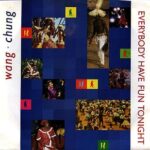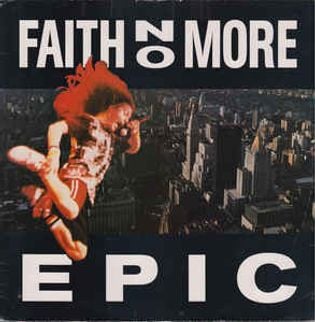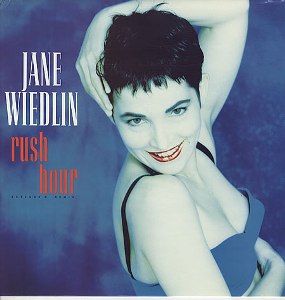 There are songs that define a decade — not through deep introspection or political commentary, but through pure, unfiltered energy. Wang Chung’s 1986 smash “Everybody Have Fun Tonight” is one of those lightning-in-a-bottle moments that crystallized the spirit of the 1980s. It’s not just a pop song; it’s a cultural time capsule — a neon-lit celebration of excess, optimism, and the communal joy of letting go. From its pounding synths and massive chorus to its instantly memorable lyric “Everybody Wang Chung tonight,” the track became both an anthem and a cultural phenomenon. Nearly four decades later, its energy hasn’t faded — if anything, it’s only become more iconic, embodying an era where music, fun, and freedom collided under the bright glow of MTV.
There are songs that define a decade — not through deep introspection or political commentary, but through pure, unfiltered energy. Wang Chung’s 1986 smash “Everybody Have Fun Tonight” is one of those lightning-in-a-bottle moments that crystallized the spirit of the 1980s. It’s not just a pop song; it’s a cultural time capsule — a neon-lit celebration of excess, optimism, and the communal joy of letting go. From its pounding synths and massive chorus to its instantly memorable lyric “Everybody Wang Chung tonight,” the track became both an anthem and a cultural phenomenon. Nearly four decades later, its energy hasn’t faded — if anything, it’s only become more iconic, embodying an era where music, fun, and freedom collided under the bright glow of MTV.
The Pulse of the ’80s
“Everybody Have Fun Tonight” is pure 1980s pop alchemy. Released as the lead single from Wang Chung’s 1986 album Mosaic, it was produced by Peter Wolf (not the J. Geils Band frontman, but the Austrian producer who helped define that era’s glossy sound). The song’s DNA is unmistakably ’80s — shimmering synth textures, pulsating electronic drums, bright guitars, and an irresistible sense of propulsion that never lets up.
Right from the opening seconds, the track bursts to life with a wall of synthesizers and a steady beat that demands motion. There’s a built-in momentum to the rhythm — like a car accelerating down a city highway with the windows down and the neon blurring by. The song’s tempo is carefully calibrated to evoke energy without aggression — it’s exuberant, but it never loses its sense of polish. The production feels both slick and spontaneous, a hallmark of mid-’80s pop craftsmanship.
And then, of course, comes the hook — “Everybody have fun tonight / Everybody Wang Chung tonight.” It’s both absurd and genius, a phrase that’s meaningless in any literal sense but perfect in its musical cadence and infectious rhythm. It’s the kind of lyric that you can’t get out of your head, and that was exactly the point. The band managed to turn their name into a verb — a rare and remarkable feat in pop history.
From New Wave to Pop Mainstream
Before “Everybody Have Fun Tonight,” Wang Chung were known more as a cerebral new wave band than as party-starters. Early in the decade, they had scored minor hits like “Dance Hall Days” and contributed to the soundtrack for William Friedkin’s To Live and Die in L.A., a moody, synth-heavy collection that showcased their atmospheric side. But by 1986, the duo — Jack Hues and Nick Feldman — were ready to evolve. They wanted to capture the exuberance of live performance, the electric connection between audience and artist, and translate that into a pop song that felt alive.
The result was a track that retained their sophistication but wrapped it in something bolder, brighter, and more immediate. “Everybody Have Fun Tonight” marked a pivot from the cool detachment of early new wave into the technicolor warmth of mainstream pop. It didn’t just fit the times — it defined them. The song hit No. 2 on the Billboard Hot 100 and became a staple on MTV, fueled by a music video that perfectly captured the decade’s aesthetic: jump cuts, flashing lights, split frames, and kinetic visuals that almost dared you to blink.
Wang Chung had officially gone from art-pop outsiders to party-pop icons.
The Magic of Simplicity
At its core, “Everybody Have Fun Tonight” is deceptively simple. The chord progression is straightforward, the melody instantly accessible, and the lyrics minimalist. But within that simplicity lies its brilliance. The track operates on the same principle that powers great party songs — repetition as hypnosis. The more you hear it, the more it pulls you in.
Jack Hues’s vocal delivery is a key part of that magic. His voice balances excitement with a slightly ironic detachment, never descending into camp but always aware of the song’s playful absurdity. When he belts the chorus, it feels like he’s not just performing — he’s inviting you in. There’s an inclusivity to his tone that’s essential to the song’s appeal. Everybody means everybody.
The production, too, knows when to hold back and when to explode. The verses are relatively restrained, building anticipation with clean guitar strums and a pulsing bassline. Then the chorus hits like a wave — big, bright, and euphoric. The dynamic contrast gives the track a sense of movement and release, mirroring the emotional arc of a night out: the build-up, the breaking free, the communal joy of the moment.
The Power of Positivity
At a time when pop music often flirted with cynicism or dark undertones — think of Depeche Mode, Tears for Fears, or The Cure — “Everybody Have Fun Tonight” was almost radical in its optimism. It wasn’t trying to be deep or mysterious. It wasn’t hiding behind irony. It was a full-throttle embrace of joy, and that made it stand out.
There’s an almost philosophical undercurrent to that kind of positivity. By proclaiming that everyone should have fun tonight, Wang Chung was doing more than promoting hedonism — they were celebrating the universal need for release and connection. The song suggests that no matter your troubles or background, there’s value in losing yourself to joy, even if only for a night.
That message resonated in 1986, a year of excess and optimism at the height of the MTV era, but it continues to feel relevant. The song’s unpretentious joy feels almost rebellious in an age of irony and detachment. To “Wang Chung tonight” isn’t just about partying — it’s about participating in something larger than yourself. It’s communal, inclusive, and life-affirming.
The Sound of Sonic Euphoria
Musically, the track is a marvel of production precision. Every sound — from the bright synth stabs to the crisp snare — feels intentional. The mix is lush but clean, with each instrument given room to shine. Peter Wolf’s production draws from dance music and rock alike, merging live instrumentation with electronic elements in a way that feels organic.
The drum track, likely a combination of electronic programming and acoustic layering, provides a perfect backbone. It’s relentless but not mechanical, propelling the song forward without overshadowing the melody. The bassline adds groove and depth, anchoring the rhythm while giving the track its subtle funk flavor.
Then there are the synths — bright, glassy, and endlessly engaging. They shimmer and swirl around the vocals, adding texture and color. The guitar work, too, is a highlight, alternating between clean rhythm chords and melodic accents that give the song its sense of movement.
But perhaps the most impressive element is the song’s structure. Despite its pop sheen, “Everybody Have Fun Tonight” unfolds with the complexity of a well-crafted dance track. The energy rises and falls in waves, with breakdowns, rebuilds, and crescendos that keep the listener engaged from start to finish. By the final chorus, when everything kicks back in at full volume, it feels like a celebration fully realized — the sonic equivalent of confetti bursting into the air.
The Video That Defined an Era
Of course, no discussion of “Everybody Have Fun Tonight” would be complete without mentioning its music video — one of the most instantly recognizable visual artifacts of the 1980s. Directed by Godley & Creme (the visionary duo behind countless MTV-era classics), the video was both groundbreaking and notorious.
Using a rapid-fire jump cut technique, the video flickered between frames so fast it appeared as though the band and background were vibrating. It was exhilarating, disorienting, and completely unlike anything else on MTV at the time. The video became iconic not just for its visual style but for how perfectly it captured the song’s kinetic energy.
It wasn’t without controversy — some broadcasters even issued warnings about the rapid editing potentially triggering seizures — but that only added to its mystique. The video became a defining image of the MTV era: bold, experimental, and unapologetically flashy. Just like the song itself.
From Catchphrase to Pop Legacy
“Everybody Wang Chung tonight.” It’s one of those phrases that entered the cultural lexicon and never quite left. Over the years, it’s been referenced in movies, TV shows, and even political speeches. It became shorthand for carefree fun, for letting loose without pretense.
That kind of linguistic immortality is rare in pop music. Turning your band’s name into a verb — and having it stick — is an achievement few can claim. It speaks to how deeply the song embedded itself in the collective consciousness.
More than that, “Everybody Have Fun Tonight” became a defining symbol of the 1980s’ ethos. It’s upbeat without being shallow, bold without being arrogant, and universal in its appeal. It’s the kind of track that transcends genre — equally at home on a pop radio playlist, a retro dance floor, or a nostalgic movie soundtrack.
Even decades later, its appeal hasn’t dimmed. The song continues to appear in films and TV shows, from The Simpsons to Grown Ups 2, serving as shorthand for ’80s joy and energy. It’s one of those rare pop songs that feels as alive now as it did upon release.
A Joy That Endures
The beauty of “Everybody Have Fun Tonight” lies in its timelessness. It may be sonically tied to the ’80s — with its synths, gated drums, and slick production — but its spirit transcends that. The joy it exudes is universal and eternal.
That’s the secret to its longevity. The song doesn’t rely on nostalgia; it creates it. Play it at a party today and watch as people, young and old, start to smile, move, and sing along. There’s something about that chorus — its openness, its lack of pretension — that taps directly into the human instinct for connection and release.
It’s easy to dismiss “Everybody Have Fun Tonight” as lightweight pop, but that misses the point. The track’s genius lies in how effortlessly it delivers joy. It doesn’t need to be complicated or profound. It’s an anthem of pure experience, a soundtrack for the moments when thinking gives way to feeling.
Conclusion: Everybody Still Wang Chungs Tonight
Nearly forty years after its release, “Everybody Have Fun Tonight” remains one of the most recognizable and beloved anthems of its era. Wang Chung captured something eternal — the need to celebrate, to connect, to let go. The song’s combination of infectious rhythm, universal message, and audacious simplicity make it not just a relic of the 1980s, but a perpetual mood-lifter.
For all its flash and fun, the song carries an undercurrent of sincerity. It invites everyone — no matter who or where you are — to share in the joy of the moment. It’s about inclusivity through rhythm, connection through sound. That’s why it still feels fresh, still inspires smiles, still makes people dance.
When Jack Hues belts out that immortal line, “Everybody have fun tonight!” it’s not just a command. It’s a promise. And somehow, all these years later, Wang Chung is still keeping that promise — one joyful chorus at a time.


